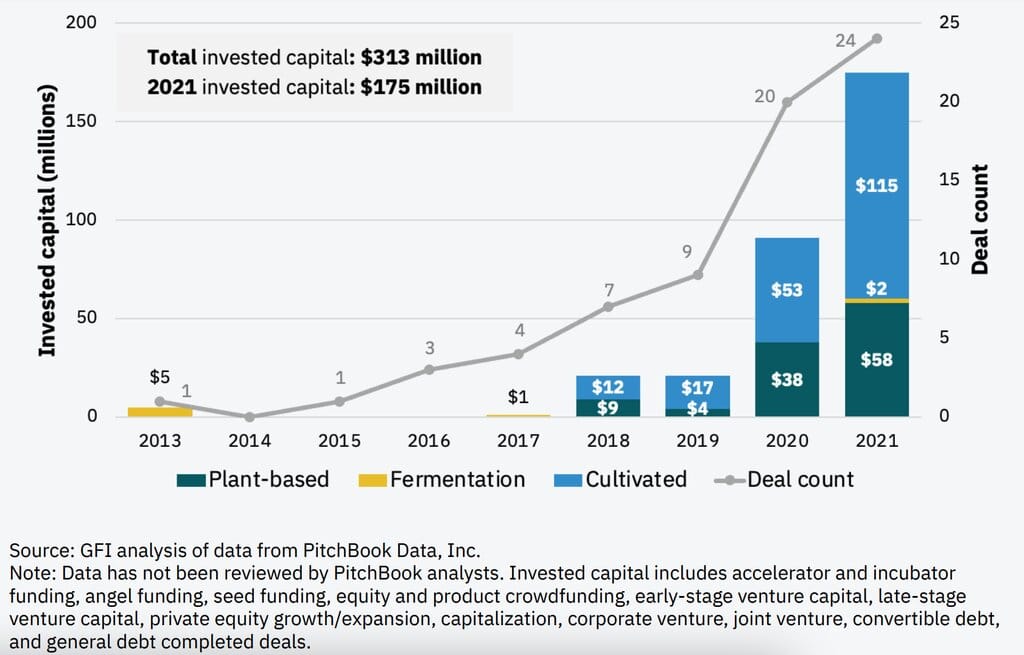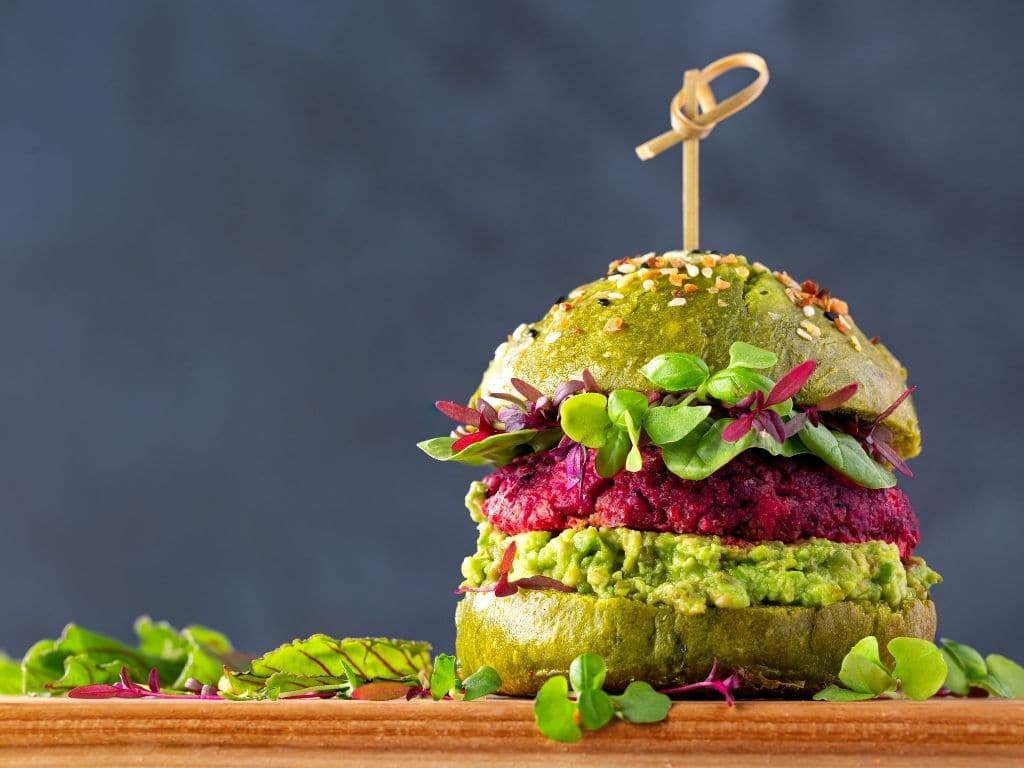People nowadays consume nearly twice as much food as they did just 50 years ago. While roughly half of the world’s population relies on seafood as their primary source of protein, increased market needs for fish have driven the world to overfish. It might seem that fish alternatives have been left behind in the alt-protein market, but food scientists are working relentlessly to develop plant-based seafood – and it seems likely that they will catch up on alternative meat production in the next few years. As people across the world turn plant-based for Veganuary 2023, here is why we need to shift away from fish and what plant-based seafood companies are leading the way.
—
Why Do We Need Plant-Based Seafood?
Over three billion people around the world rely on fish as their primary source of protein. Since the 1960s, more than 30% of commercially fished waters have been classified as ‘overfished’ and another 60% are fished at their maximum sustainable levels to meet the ever-rising food demand resulting from a constantly growing human population and the resource-intense modern diet. Humans are fishing at biologically unsustainable rates, significantly affecting marine wildlife and disrupting the global ocean ecosystem. As a result, fishes are disappearing faster than they can be replaced and if we do not slow down, the world’s oceans will be “virtually empty” by 2048.
But human activities are not the only driver of marine biodiversity decline. Climate change-related phenomena such as ocean acidification and sea level rise are also expected to decrease ocean net primary production between 3% and 10% and fish biomass by as much as 25% by the end of the current century, a report found.
We are also polluting our waterways at an unprecedented and incredibly dangerous rate from the extensive use of fossil fuels to generate electricity and the use of toxic chemicals in agriculture to the amount of waste we generate every day around the world. Every year, more than 8 million tonnes of plastic make their way to our oceans. Instead of deteriorating, it breaks down into smaller pieces known as microplastics. Today, an estimated 51 trillion pieces – a quantity that outnumbers the stars in our galaxy by 500 times – float in our oceans and it is often unavoidable for marine creatures to ingest them in large quantities. Around 50% of fish in the Mediterranean Sea and 80% of fish larvae in EU estuaries have ingested some quantity of microplastic. Not surprisingly, a 2019 study estimated that an average American citizen ingests between 74,000 and 121,000 plastic particles every year, depending on age and sex. Indeed, the particles ingested by fishes inevitably end up in human bodies through the modern food chain and despite their microscopic size, they are extremely toxic and harmful to human health.
Because of the high content of toxic chemicals that seafood contains, reducing our intake of fish will not save us from the dangers that these substances represent to human health. Moreover, the contaminants found in fish often outweigh the benefits of Omega-3 fatty acids. For these reasons, the only solution we have to save our planet and stop compromising our health is to give up fish altogether.
In recent years, a growing number of companies and startups have realised the importance of shifting to plant-based seafood to help reduce the demand of fresh seafood, alleviate the global overfishing problem and stress on the already-deleting marine population. A large-scale shift to alternative fish would also reduce the rates of by-catching and environmental impacts to ocean habitats. In 2018, global seafood production reached a level of 179 million metric tons, 80% of which went towards human consumption. This amounts to an average consumption of 20.5 kg per capita.
Plant-Based Seafood Companies Offer a Valid Alternative
Obviously, a way to reduce our intake of seafood is by switching to a vegetarian diet. But with huge progress made in the plant-based seafood industry in recent years, it does not mean that we have to give up the taste of fish altogether. Similar to what brands like Beyond Meat and Impossible Foods have done for the meat industry, plant-based seafood companies are working on growing a new protein market, moving on from the already popular fingers and crumbed fish burgers to new products such as plant-based analogues of fish fillets that can satisfy the still unmet demand in the industry.
Sales from the plant-based fish sector rose by 42% between 2019 and 2021. In the latter year alone, nearly US$175 million were invested in startups developing vegan seafood, nearly double the total investment in 2020 and up from $250,000 just six years prior, showing how much the interest in this industry has grown in such a short time. The Smart Protein project, a leading initiative aimed at developing sustainable future foods, has received funding from the European union’s Horizon 2020 research and innovation programme to develop the next generation of plant-based fish.

Annual Investment in Alternative Seafood Companies, 2013-2021. Image: Good Food Institute.
In order to develop a guideline on the best ways to develop fish alternatives, the Consumer Advice Centre in Hessen, Germany – where the plant-based sector is particularly developed – conducted a survey to find what consumers expect from vegetarian and vegan seafood products. Researchers found that, aside from a recognisable fish flavour and texture, there is a strong desire for less-processed alternatives with similar components as fish. This signals the need to find a way to incorporate all the nutrients that make fish such a beloved and nourishing food – such as omega-3 fatty acids, iodine, and vitamin B12 – in alternative products. Last but not least, consumers agree that the price of plant-based fish is still too high, with alternative breaded fish sticks costing nearly 60% more than conventional ones.
You might also like: Plant-Based Seafood Might Be More Popular Than You Think
Top Plant-Based Seafood Companies
1. OmniFoods (Hong Kong)
Hong Kong-based OmniFoods, originally known for their plant-based pork mince OmniPork, recently expanded their offerings to include six seafood products: two different fish fillets, an ocean burger, salmon, shelf-stable tuna, and crab cakes. In late 2021, the company announced a partnership with Starbucks to serve OmniSeafood’s Omni Crab Cakes across 170 locations in Hong Kong, signalling a change in mainstream demand among Asian consumers.
OmniFoods also stepped up efforts in price parity, reducing the price of its Omnipork by 22% in a bid to make plant-based food more accessible. According to the company’s CEO David Yeung, the only key to price parity is to scale up production and tap more markets, something that might happen in two to three years based on the growth trend the industry is experiencing.
2. The Plant Based Seafood Co. (US)
In over 20 years of successfully creating and selling award-winning seafood products, this all-female, family-owned company experienced first hand the unacceptable and sometimes hidden practices in the industry. Their exposure to these issues made clear the only way to a sustainable future is to switch to plant-based alternatives.
Today, The Plant Based Seafood Co. sells six different seafood alternatives, from crab and lobster cakes to scallop and shrimp. The latter – made with 100% plant-based ingredients – was named Most Disruptive Product of 2020 at Prepared Foods’ Spirit of Innovation awards. In 2021, the company announced a partnership with Pod Foods – a B2B distribution platform that connects emerging food brands with grocery buyers – for retail launch in the US.
3. Good Catch (US)
From crab cakes and fish sticks to incredibly realistic fish fillets and salmon burgers, the secret of US-based food tech company Good Catch’s alternative seafood products lies in its flavourful six-legume blend of peas, chickpeas, lentils, soy, fava beans, and navy beans. “Foodservice is incredibly important to emerging plant-based brands because it serves as a trial driver for curious consumers. Without trial there is no adoption – and that trial is the single most important moment for any new product,” said Chris Kerr, founding board chair and co-founder at Gathered Foods, makers of Good Catch.
In 2021, the company secured US$26 million in funding to further fuel its plant-based expansion into European and global markets and in 2022, including a deal with US-based Sprouts Farmers Market to launch their new breaded-product nationwide.
4. Fazenda Futuro (Brazil)
Brazil-based Fazenda Futuro, created in 2019 and internationally branded as Future Farm, originally specialised in alternative meat products. Its revolutionary Future Burger patties made 100% from plants and natural ingredients were recently certified as carbon neutral globally. The company’s attention to detail and sustainable approach to production ensures that 100% of their global carbon emissions globally – from growing the crops to disposal at homes – are counterbalanced, not only by offsetting but also by reducing the company’s carbon footprint in the first place. Manufacturing the Future Burger with natural processes and using responsibly sourced ingredients as well as packaging the product in biodegradable or recyclable trays and paper sleeves allowed the company to save approximately 1,400 tonnes of carbon a year, the equivalent of around 4 million kilometres driven by car.
The company has recently ventured into the plant-based seafood market, bringing the first plant-based tuna to Brazil. Aside from being produced with natural ingredients such as soy, peas, chickpeas, olive oil, and radish, developers included microalgae oil to provide omega-3s and satisfy consumers’ demand for plant-based products with similar nutritional values as traditional fish. In 2021, Future Farm raised US$58 million, bringing the total market value of the brand to about US$418 million and positioning itself as a global leader of plant-based alternative food.
5. CURRENT FOODS (United States)
San Francisco-based food tech startup CURRENT FOODS specialises in sushi-grade plant-based fish alternatives like bluefin tuna and salmon, and was one of the first plant-based seafood companies to address the lack of vegan alternatives to sushi-like raw fish in the market.
Its plant-based Tuna, made with radish, bamboo, algae, and pea protein and with high nutritional values including iron, vitamin B12, and omega-3 fatty acid was named one of TIME’s top 100 best inventions in 2021. In the same year, the company partnered up with Poké Bar restaurants in North America, bringing its revolutionary product to 40 locations across five US states.
You might also like: Which Plant-Based Milk Is Right For You?


















